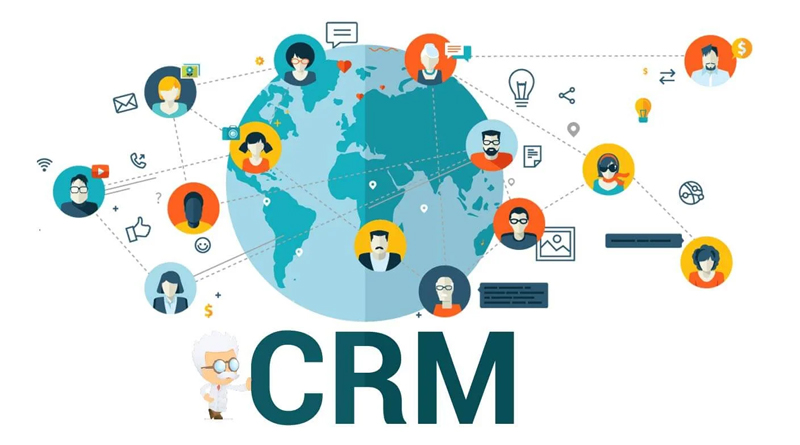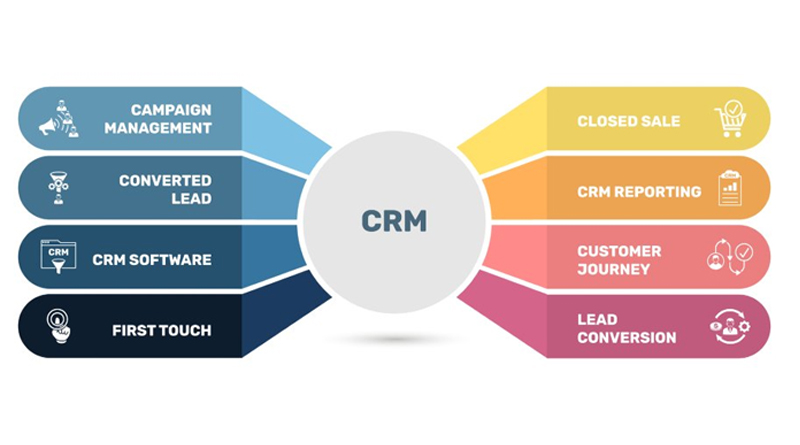Boost Your Sales with the Best CRM Software
There are many useful tools that help you optimize search engines, keyword research, writing and creating appealing content, and other areas that must be taken care of to have a successful business if you are active in the online marketing field. All that aside, the main goal of a business is to keep customers satisfied so they come back to you when they need you, and building a healthy relationship with your customers is the key. Speaking of tools, there are also tools for customers relationship in the online marketing business; one of the most needed, practical, and essential tools in a business is a CRM. This CRM review elaborates on what CRM is and the features of a perfect CRM for sales. Stay tuned to learn popular CRM and see which suits your business best.
What is CRM and How Does CRM Work?
Short for Customer Relationship Management, CRM is a helpful tool to manage and extend relationships with your customers to guide them and help them through their purchases. It refers to a set of procedures, strategies, approaches, and technologies business companies use to manage and analyze customer interactions and data throughout a customer’s lifecycle.
The objective is to enhance customer relationships and retention while helping with sales. Therefore, you can boost your sales using CRM for sales management.
As CRMs have been expanding topic over the years, there are a ton of high-quality and useful CRMs, each suitable for a purpose. You can track your customer’s overall journey through your company and stay coordinated with your teammates during the process, no matter where they are in the world.
Whether a large enterprise or a small business, you can find the best CRM for sales management.
But first, let’s see what features make a CRM functional and useful for you and what you should consider before buying and applying one to your workflow.

Best CRMs for Sales Primary Features
A CRM system typically consists of various tools and features that allow companies and users to track interactions and communications across different channels, manage customer data and automate sales and marketing. It also gives insights into customer behavior and interests. CRM’s ultimate goal is to assist the business in building long-term relationships with customers, improve customer satisfaction and loyalty and increase revenue and profitability.
Aside from building a long-lasting relationship with customers, the best CRM for sales has certain features that make them a good company for your company.
First, let’s take a quick look at CRM’s primary features and benefits.
- Improved Customer Relationships
Businesses can create a personalized and consistent customer experience and increase customer satisfaction and loyalty by managing data, interactions, and preferences in one place. Assuring the customers they are valued and cared for will build a healthy and beneficial relationship. A CRM tool can make that happen.
- Simplify the Process
A CRM tool allows for managing and simplifying customer support and sales by modifying the process. It also makes collaboration with the whole team much easier.
- Identify Potential
Using a CRM helps identify potential leads and smooths communication with new customers to guide them toward the right purchase.
- More Sales
Since a CRM can manage customers’ info, it notifies you about a birthday, location, or special occasion so you can customize and personalize communication.
This is a way to show your customers that you support them and have new offerings for them, which, eventually, the right offer can lead to better deals.
- Cost-effectiveness
Typically, CRMs are cloud-based software you can easily access by purchasing a subscription. CRM tools provide features that are normally worth the price. You wouldn’t need to worry about updates and other technical affairs.

Features to Consider If You Want to Choose a CRM for Sales
The mentioned points are basic features every CRM offers, but to choose the right one for your business, you need to consider more practical factors in the first step. A CRM for small businesses may differ from a more sophisticated one suitable for enterprises and larger companies. Therefore, recognizing your needs and the features you want from a CRM will push you one step ahead.
Top CRMs core features
- Sales Management
A CRM allows companies to monitor and control the whole sales process, from lead generation and qualification to deal closing and post-sales follow-up.
- Marketing Automation
This feature helps companies and businesses automate and manage the entire sales strategy and marketing campaigns, including email marketing, social media, and advertisement.
- Analytics and Report
CRM provides analytical reports and enables them to make data-driven decisions by giving them information and insights about customer behavior, sales performance, and marketing campaigns. These reports are displayed visually, making reading and analyzing the results much easier.
- Contact Management
This feature allows businesses to manage and store and manage customer contact information like name, address, phone number, email address, and social media handles. Accessing this information helps with customizing the relationships with each client.
- Customer Service and Support
The sales process doesn’t finish when the customer makes the purchase, and it’s necessary to be there for support and service in case they need anything. So, this feature allows companies to manage customer questions, problems, and complaints across multiple channels, including email, phone, social media, and chat.
What Are the Secondary Common Features of CRM for Sales?
The mentioned above are basic features every CRM provides. CRMs also have additional features that may vary from one CRM to another. They are as the following:
Better Sales and Marketing Performance
Businesses can enhance their sales and marketing strategies, target the right customers and produce more leads and income with access to real-time data and insights. This will help with recognizing the potential leads and customers who are possible to convert.
This feature is popular among the best CRMs for sales reps as it’s one of the main goals of online marketing. It’s a win-win process.
More Flexibility and Scalability
CRM systems can be modified and scaled to meet the company’s needs, allowing them to adapt to changing market conditions and growth opportunities.
More Efficient Customer Service and Support
Businesses can improve their reputation and branding and increase customer loyalty using a CRM for sales management by providing timely and personalized customer support.
Sales Data Analysis
One of the prominent features of a CRM is the ability to get reports on previous sales and campaigns, analyze the data and rectify the possible issues for future campaigns. It gathers and stores social media activity data to help users improve their campaign strategies.
Mobile CRM
Another feature that top CRMs offer is the mobile app which makes customer relationship management much more accessible and easier. You can install the app on your phone and manage and track everything on the sales section remotely. You will also be able to collaborate with your team. Additionally, a mobile CRM includes GPS tracking, voice-to-text input, and image and document capture, which help sales reps be more productive and efficient while on the go.
Integration with Other Platforms
A proper and qualified CRM for sales offers you all the tools you need and facilitates the process. Using a good CRM with email integration helps you do all the relationship management and email communication with customers in your CRM. Moreover, a good CRM should be able to integrate with other platforms, such as ERP and HR software.
User-friendly Interface
Another feature of the best CRM for sales management is the user-friendly interface and accessibility to all the features and options without getting lost in the platform.
Proper Data Storage
The CRM helps you store files and data in an easily attainable way so you can pull out or share the files or customers’ information from your previous interactions. This smooths communication and accelerates customer support.
Campaign Management
In online digital marketing, running campaigns and managing them till the end requires precision and availability of reps and support. This feature enables you to manage campaign ROI, schedule posts and emails, and analyze results and data.
Best Popular CRM for Sales
With digital marketing growth in the past few years, developers have come up with new ideas to make sales and SEO a piece of cake. They created platforms to boost marketing and optimization. There are several writing tools, SEO tools, CMS, and CRMs that you can implement in your workflow. In the following, we mention some of the best CRMs for sales.
- Pipedrive
Focused on sales pipeline and management, Pipedrive offers features like lead management, deal tracking, sales forecast, and integration with other platforms.
- Salesforce
Salesforce is a cloud-based CRM that is suitable for businesses of all sizes. It provides options such as opportunity management, lead management, and more marketing features.
- Hubspot
Hubspot is another CRM system with sales, marketing, customer service, lead management, contact management, and deal tracking features.
- Zoho CRM
Various sales and marketing features, such as lead management, contact management, sales forecasting, and workflow automation, are available in the Zoho CRM system.
- Copper
Copper is a CRM system provided by G Suite. It offers features like integration with other G Suite apps, lead management, contact management, and sales forecasting.
Some of the mentioned above are also great CRMs for real estate as well. If you run a real estate business, using a CRM will get you steps ahead and keeps you on top of the industry.
Sales CRM for Small Businesses
A CRM is a useful tool that makes the workflow and marketing process easier. It helps manage the chunk of customer and sales data. However, if you are taking the first step in your marketing journey, a simple CRM might be best for you. They are mentioned below if you are looking for a sales CRM for a small business.
- Monday.com
- Zendesk Sell
- Insightly
- Freshsales
- Salesforce
- Pipedrive
- Zoho CRM
How to Find the Best CRM for Sales
Finding the right CRM for your business might be intimidating, but with proper strategy and enough knowledge, you will find the one. However, a few factors must be considered before buying a CRM.
- Identify your needs
It’s the first step. If you don’t know your needs, you can’t find the solution to meet them. So identify your need and expectations from a CRM, which may include lead management, contact management, and deal tracking.
- Determine your budget
Evaluate the pricing of the CRM system you are considering and compare it to your budget. Make sure to choose the ones with transparent pricing plans.
- Consider scalability
Make sure to choose the CRM that will scale with your business as it grows. It enables you to modify and customize it as you see fit.
Final Thoughts
Overall, a CRM system is necessary to properly and accurately manage your sales and marketing. It also gives you insights on how to grow more leads and reach convertible customers. Moreover, it offers features that impact your growth positively and improves efficiency and productivity. The right CRM for sales alongside SEO tools can boost your sales, guarantee long-lasting revenue, and builds healthy customer relationships.




